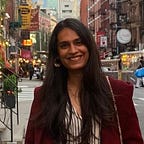Ash Wednesday Without Ashes?
“I was going to say it is good to see all of your smiling faces. But, of course, that’s ridiculous. But it is good to see all of you,” said the Rev. Canon Patrick Malloy as he addressed a group of masked churchgoers on the steps of the Cathedral Church of Saint John the Divine on Amsterdam Avenue in New York on February 17, 2021.
Malloy, along with the Rev. Canon Steven Lee and the Rev. Paul Daniels, stood outside the gate in beige, white and red robes as they welcomed the worshippers for Ash Wednesday. Despite the freezing weather, about 30–40 people — bundled up in puffer coats, thick gloves, beanies or furry hoods — gathered for the occasion. While some clasped their hands together in prayer, some had their heads bowed down and were reading along as the service proceeded.
Before Lee started his sermon, he said, “For the past twelve months, our Cathedral community has been fasting and in self-denial…We have fasted from seeing each other, from receiving a blessing in person. We have fasted from coffee hour, from community, from the cookies, food, laughter. Just simple human connection.” The crowd echoed his sentiments.
Post the ceremony, some members asked for ashes and were denied by the staff. Malloy said, “We decided not to have the ashes because we felt that it wouldn’t have had any integrity or any dignity. And then the Bishop of New York issued a mandate that we could not have any ashes. That made our decision even more solid.”
A group of three elderly women waited after the service to catch up with one another. Ruth, who has been a member of the Church since 1993, misses coming to Church. She said it was a very difficult time but was also grateful that Zoom made it possible to attend the morning prayers. Another member said that she would be attending the screening of the day’s ceremony on Zoom in the evening as well.
This is just one instance of how COVID-19 has changed religious services and rituals. Several institutions had to find new ways to reach out to members of their faith when people weren’t allowed to visit the physical institution. A few others welcomed members, but with restrictions.
Mbemba Bangoura, President of Masjed Al-Falah on Frederick Douglass Blvd, said that they had to shut down the mosque when the pandemic started. But unlike the Cathedral, they reopened after three months. They have been following all social distancing guidelines and have also been cleaning the prayer area and bathrooms regularly. He said, “We were all tense. But nothing happened to me, to my family. And we thank God for that.”
Rabbi Yuda Drizin, Co-director of the Chabad at Columbia University, oversees an Observant or Orthodox Jewish community along with his wife Naomi. He notes that there are limitations as to what they can do virtually. Not being able to use electronics on Saturdays or Shabbat — their typical time of prayer — makes it impossible to have virtual meets.
But he adds that this medium has opened up several new doorways. He said, “I can study with students that are out of state, out of the country. We could have done it in the past but it’s just something we never thought to do.” He also noted another important change. “Now, people have to figure out how to be Jewish at home, alone. Figure out how to connect with the religion when you can’t go to the synagogue and hang out with your friends and do it together.”
Malloy also confirmed an increase in engagement due to online meetings. He said, “The numbers of people who attend our services have increased thousand-fold. People are now coming to prayers from all over the world.” Once the pandemic is over, the Cathedral has decided to continue certain online services along with in-person assemblies. He explained, “The virtual medium is an important way to gather.”
The Cathedral has organized online weekday prayers in the morning and evening as well as virtual Sunday Service. They have planned a game called Lent Madness as a way to educate members and increase engagement. They have also been conducting live music sessions every Tuesday evening.
Their weekly Soup Kitchen is now offering meals in bags instead of allowing people to sit at the tables. Malloy said, “Not being able to allow them to sit together and eat in a dignified manner is a great loss. We want to bring people back inside as soon as we can.”
He added, “This past year was undeniably difficult. But, at the same time, we’ve learned a lot. And we will take this with us into the new normal when the Church is open for in-person worship. I think it’s been painful. We have had a lot of loss. But it hasn’t been a total loss and that is important.”
Produced as part of classwork at Columbia Journalism School.
